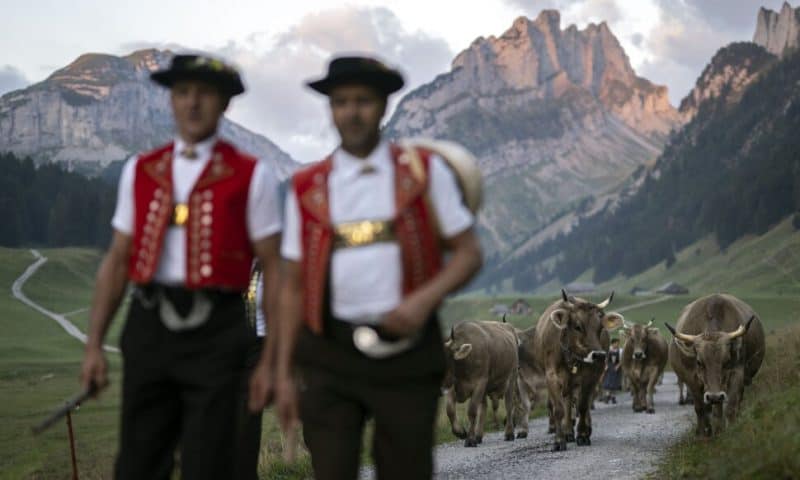There’s more to the European nation than the picture-postcard scenery.
When it comes to Switzerland, it’s not all chocolate and cheese.
The country at the heart of Europe is also home to the world’s largest publicly held food and nutrition company – Nestle – and scores of pharmaceutical companies including global giants Hoffman-LaRoche and Novartis.
“Obviously, the landscape is beautiful, the chocolate is amazing,” says Diccon Bewes, who moved to Switzerland from England 17 years ago and is a travel writer based in Bern. But Bewes says the secret to life in Switzerland is a consensus approach to life and politics that celebrates personal responsibility yet provides a social system while also embracing work-life balance.
“The positives for me are quality of life,” he adds. “All the shops are closed on Sunday, still. People generally stick to their 40- or 42-hour work week.”
Switzerland’s reputation for a great quality of life is part of the reason it tops the 2022 Best Countries rankings, which this year surveyed more than 17,000 global citizens to gather perceptions about 85 nations. The mountainous central European country snagged the No. 1 spot overall for the fifth time, and placed No. 4 in the quality of life subranking.
Switzerland is a modern country with a highly educated and engaged population, and survey respondents viewed it positively in connection with many attributes, including caring about human rights, being health-conscious and safety, where it ranks No. 1. The country also ranks highly for the stability of its politics and economy.
The Swiss, Bewes notes, have made an art of taking low-value items and using their skilled workforce to turn them into high-value products, a prime example of which is Nespresso.
The Nestle unit, based in Lausanne on the shores of Lake Geneva, is an international household word for its capsulized, single-use espresso coffee. The company has taken low-value beans and made them a worldwide export, which has helped Switzerland become among the world’s largest coffee exporters.
Yet despite its status as a leader in global finance and business, “the Swiss economy is dominated by small and medium-sized firms, which constitute more than 99% of the total number of its enterprises,” according to a GIS Reports summary in 2019.
“While it is also true that every year more than 25 million watches and clocks are produced in Switzerland, they only account for 9% of Swiss exports,” noted GIS, a geopolitical economic forecaster. “Chemical and pharmaceutical products make up more than 44% of the country’s total exports: machinery and electronics over 14%.”
And despite being tethered to the broader European economy, the small nation managed to weather the COVID-19 pandemic better than many of its neighbors.
“Globally competitive companies, a highly skilled workforce and low reliance on hospitality and entertainment activities mitigated the adverse impact of pandemic containment measures,” the Organization for Economic Cooperation and Development says in its 2022 country report.
The Alpine nation has perfected what many other industrialized nations have eschewed: creating a highly-skilled workforce engaged in making premium products and selling them on the world market. (Switzerland ranks No. 10 on the perception of having a skilled labor force, an attribute of the entrepreneurship subranking.) It has the second-highest per capita gross domestic product in the world.
This helps explain why the country placed first on the list of nations perceived as a good place to headquarter a corporation, as well as scoring in the top five among best countries for a comfortable retirement, green living and to start a career.
“Swiss products are expensive, but they tend to fare well in domestic and international markets,” GIS noted. “Apparently, Swiss businesses find customers willing to pay the premium.”
While its economy is a mainstay of the country, it is perhaps its staunch neutrality that most defines Swiss history, dating back more than 500 years, although its forces have engaged in peacekeeping missions and it did support international sanctions against Russia for that country’s invasion of Ukraine earlier this year.
Daniel Warner, a Swiss-American political scientist and former deputy to the director of the Geneva Graduate Institute, says that while the country’s constitution excludes joining military alliances such as NATO, the broader concept of political neutrality does allow for it to host global summits and be a member of the United Nations.
The issue of political neutrality, though, “is more complex and hotly debated,” Warner says in an email. “Although Switzerland has been the scene of important summits – Reagan/Gorbachev and recently Biden/Putin – it joined the European Union in sanctions against Russia which led a Russian spokesperson to comment that Switzerland was no longer neutral.”
“The political neutrality also explains why Switzerland joined the U.N. so late despite having all the U.N. agencies in Geneva,” he adds. (The country joined the organization in 2002 following a referendum.) “Its neutrality allowed it to punch above its weight during the Cold War but has caused problems post-1989.”
Bewes says another key to Switzerland’s success is a political system that allows citizens to feel included and produces a unique form of consensus among a public that speaks four languages and is one-quarter immigrant.
“Politics here is kind of seen as a civic duty responsibility rather than a game show,” he says.

